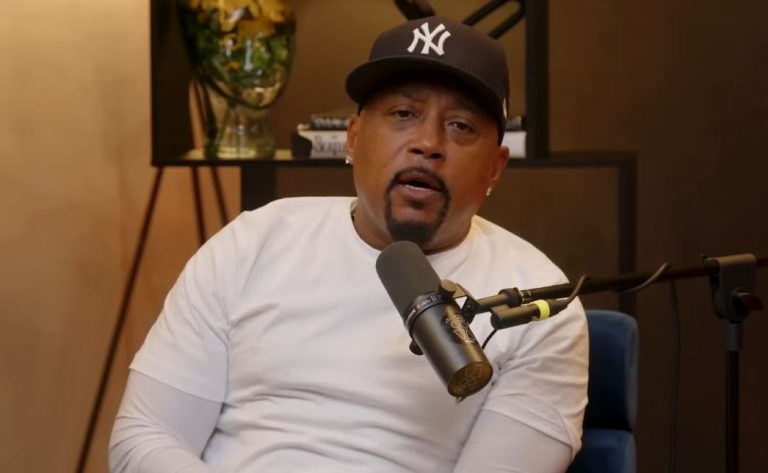Daymond John has painstakingly created an incredibly effective and inspirational financial legacy over the last thirty years. His story demonstrates how vision, perseverance, and flexibility can transform modest beginnings into enduring financial strength, as evidenced by his estimated net worth of $350 million in 2025. More than just an entrepreneurial triumph, his journey from Queens to Shark Tank fame is a model for contemporary wealth accumulation propelled by cultural intuition and individual tenacity.
Daymond was raised by a single mother in Queens’ Hollis neighborhood and was given responsibility early on. He acquired a hands-on understanding of time management and hustle by taking part in a high school program that permitted him to switch weeks between work and school. Later, as he balanced a day job at Red Lobster with late-night sessions creating urban streetwear in his mother’s house, that structure would prove to be incredibly effective.
Daymond John Bio & Career
| Full Name | Daymond Garfield John |
|---|---|
| Date of Birth | February 23, 1969 |
| Age (2025) | 56 |
| Birthplace | Brooklyn, New York, USA |
| Nationality | American |
| Profession | Entrepreneur, Investor, TV Personality |
| Known For | Founder of FUBU, Investor on Shark Tank |
| Net Worth (2025) | $350 million |
| Current Role | CEO of The Shark Group |
“For Us, By Us” (FUBU) was introduced without much fanfare or funding. It started with a mother’s willingness to remortgage her home and a $40 batch of fabric. John earned $800 in a single day by sewing 90 wool hats with a neighbor and selling them for $10 each. This was a particularly pivotal moment. It provided him with the necessary initial traction and confirmed the market potential of his fashion concepts. His approach to using cultural influence was remarkably creative after that.
FUBU became well-known by working with friends and using rappers as early brand representatives. When LL Cool J wore a FUBU cap in a 1993 Gap commercial, it was a turning point. Despite Gap’s disapproval, the placement was a brilliant example of guerilla marketing. It gave FUBU a level of exposure that most brands at the time could only hope for by positioning it as culturally relevant.
FUBU was making more than $350 million a year by the late 1990s. The brand’s total worldwide sales to date have exceeded $6 billion. For streetwear businesses, which frequently fail after a few product cycles, that degree of success is especially uncommon. In addition to its messaging, FUBU stood out for its clever use of community loyalty and celebrity alignment.
In 2009, Daymond John made the switch from fashion to television and accepted Mark Burnett’s invitation to join Shark Tank. His influence has grown considerably as a result of his appearance on the show over the years. John has used the show to invest more than $8.5 million in different startups as of 2025. Notable successes from these endeavors include Bombas socks, which have sold over $1.3 billion and are now the best-selling product in Shark Tank history.
John is incredibly flexible in his approach to investing; he has also chosen to mentor young business owners like Moziah Bridges instead of making financial investments. This act of providing value without equity shows a very giving attitude in a sector that is frequently only concerned with profits. Bombas donates a pair of socks to a person in need for each pair that is sold. John’s idea that entrepreneurship should have a purpose struck a deep chord with this model.
In addition to television, John runs the New York-based brand consulting firm The Shark Group. This company, which links startups to marketing opportunities and operational scaling solutions, has subtly grown into a strategic hub and revenue generator. John has demonstrated that his insights go far beyond fashion by leveraging strategic partnerships to spread his message with Shopify, Audible, and other Fortune 500 companies.
Daymond John has become more influential in both business and culture over the last ten years. Among his best-selling books are Rise and Grind and The Power of Broke. These pieces examine the idea that creativity can be stimulated by scarce resources, which is especially encouraging to many nascent business owners. His narratives are both tactical and personal, revealing heartbreaking blunders and victorious comebacks in a tone that is remarkably grounded and unambiguous.
John has actively utilized his position as the creator of Black Entrepreneurs Day to promote and highlight underrepresented entrepreneurs. The annual celebration of culture, resiliency, and economic empowerment takes place at the iconic Apollo Theater. Through it, he has partnered with the NAACP and a number of corporate sponsors to provide funding for business grants, mentorship programs, and scholarships, helping to create a legacy that feels far more expansive than individual benefit.
John’s wealth is the result of consistent choices, upheld principles, and a distinct brand identity rather than sudden success. He prioritizes operational viability over glitz in his investment strategy. In a market where trend-driven brands frequently rise and fall without much notice, that strategy has proven to be incredibly dependable.
Even though Daymond John hasn’t reached the billionaire status like Mark Cuban, his financial situation is remarkably stable. Profits from FUBU, Shark Tank earnings, book sales royalties, consulting fees, and equity stakes in several consumer brands make up his $350 million net worth. His wealth is both substantial and sustainable due to the longevity of his sources of income.
John has also been open about his personal journey in recent years, openly talking about his fight against thyroid cancer, his fatherhood experience, and his ongoing struggles with dyslexia. Because of these revelations, his achievements seem relatable rather than impersonal. They serve as a reminder that perseverance, not perfection, is the key to success.


